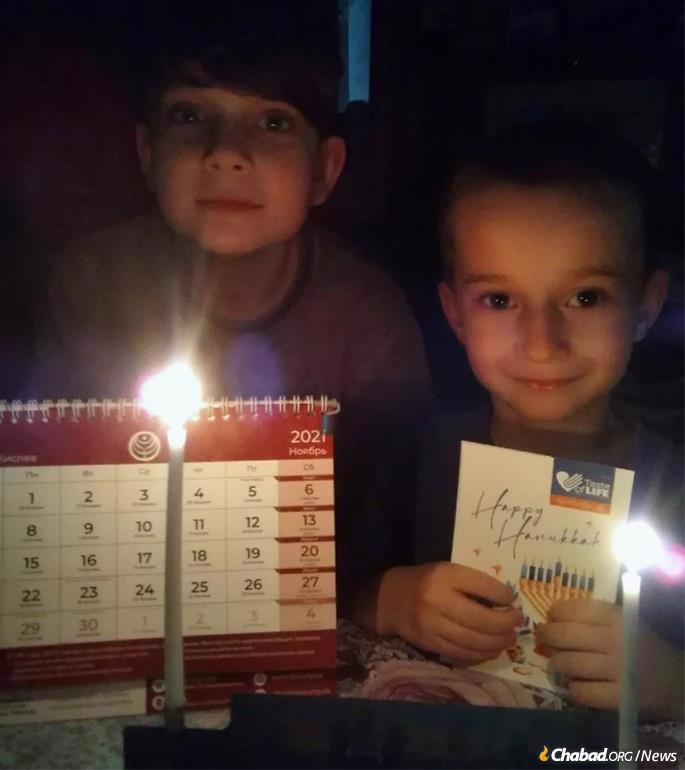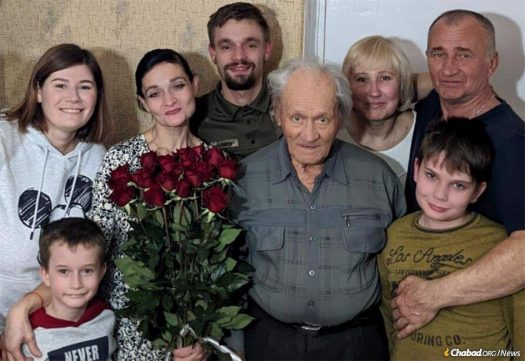
A Story of a Jewish Survival in Nikolayev, Ukraine
by Menachem Posner and Elana Pasternak Malkin – chabad.org
Every Friday night, after Elena Bessonova lights her Shabbat candles, she closes her eyes and asks G‑d to protect her family, including her adult son who serves in the Ukrainian armed forces and has experienced many horrors since the war with Russia began.
A resident of Mykolaiv (Nikolayev) in southern Ukraine, she lives in her fifth-story flat together with her elderly father, her husband, and her two younger sons, ages six and 10.
A kindergarten teacher until the outbreak of the war, she focuses on keeping her family fed, warm, and sheltered, and helping her sons continue their schooling online, and also works part-time maintaining her apartment building. When she feels sad or scared, she sings the songs her mother sang to her as a child, songs she had learned during what Russians and Ukrainians refer to as the Great Patriotic War.
After war broke out, the local Jewish community, led by Rabbi Sholom and Nechama Dina Gotlieb, of Chabad-Lubavitch of Nikolayev, offered the family free and safe passage out of the city, which was subject to heavy bombing from the start of the war, and lies near Kherson, which had been occupied by the Russians since the first week of the war.
“My father refused to leave, and I cannot leave him,” says Bessonova. “He says, ‘I will not leave here. I survived the Great Patriotic War in my town and I am going to stay here forever.’ ”
They are not the only ones who have remained behind. Far from it.
Jewish Life Goes On Despite All
Bessonova says that the synagogue was full over the High Holidays, with many people having remained put for whatever reason. “The Jewish community, as well as my kids’ sports coaches, teachers, my daughter-in-law, and other people have tried to convince us to leave,” she says. “Everyone appealed to my common sense. But my common sense says to stay here.”
Having lived through much together, Bessonova says that the people in the city have changed as a result. “The war made us stronger and brought us together,” she explains. “People have become more tolerant, more empathic to each other. We help lonely, old, sick and injured people. We share food, water, everything.”
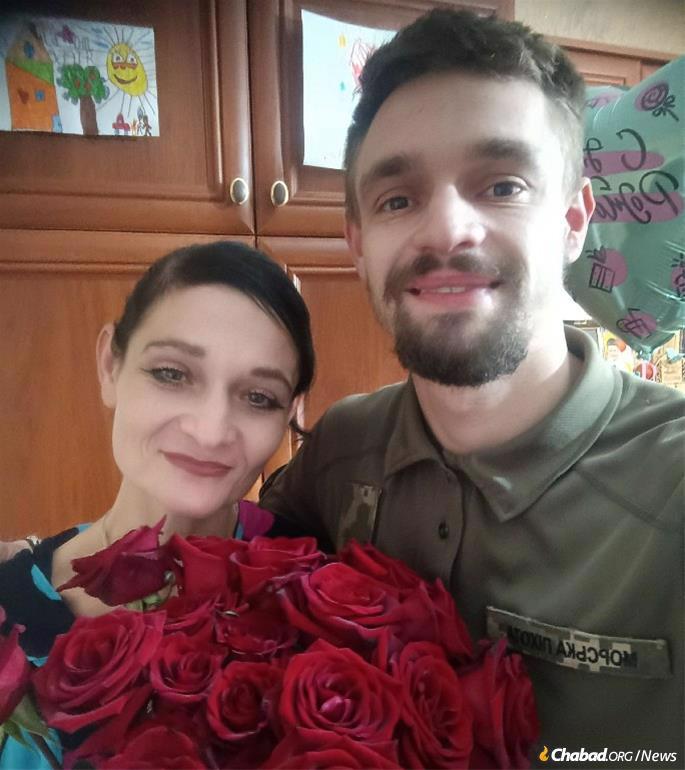
At the same time, she says that people have become accustomed to the reality of war. “In the beginning, we would run down to the shelters every time the sirens wailed.
“In the evening, when it was getting dark, we turned off the light and sat in the dark. It was really scary. We fell asleep strung up, not even undressed, ready to jump up any second, grab the children, documents and run!”
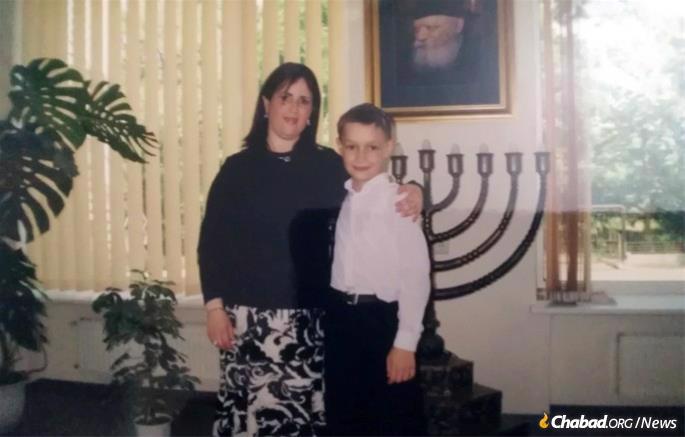
As the war wore on, they stopped going to the shelters, but would tell their son, who called from the battlefield, that they did, just to calm his nerves.
The shelters are now better equipped than they were when hostilities started, but the family no longer uses them.
Water is a major issue in the city, which lost running water when its water supply was bombed back in April. In the immediate days that followed, people subsided on river water just to stay alive.
Now, the taps are running with salty yellow water, which cannot be used for drinking, cooking, or even bathing. Instead, they rely on bottled water, wells, and trucks that bring fresh water and are placed throughout the city.
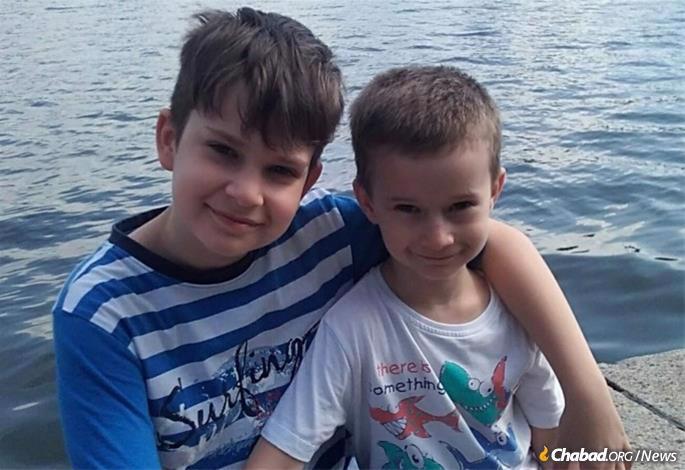
Nonstop Assistance Throughout the War
Nikolayev has a long and rich Jewish history. The Rebbe, Rabbi Menachem M. Schneerson, of righteous memory, was born there in 1902 and was the grandson of Nikolayev’s chief rabbi, Rabbi Meir Shlomo Yanovsky. The Rebbe’s early years were spent in Nikolayev, where he and his family survived the deadly pogrom of 1905.
In February of 2016 the city renamed central Karl Liebknecht street after the Rebbe, and in 2019 two Ukrainian historians co-authored the book Our Fellow Countryman Rebbe Menachem Mendel Schneerson: The History of the Lavut-Yanovsky-Schneerson Families in Mykolaiv, a study that was geared at a general audience and was published by the State Archive of the Mykolaiv Region. A recent war-time video issued by the municipality also highlighted Nikolayev’s significance as the birthplace of the Rebbe.
This year, the city had planned major celebrations to commemorate 120 years since the Rebbe’s birth, but festivities have been set aside as the city battles for its continued existence.
“We have been busy nonstop making people have food and drink, are dressed for the winter, and have a warm place to sleep,” says Rabbi Gotlieb. “With so many apartment complexes damaged by bombings, we install new windows and doors and do whatever we can to make their homes liveable.”
And since there is little electricity in the city, Jewish-community workers have helped many people settle into older homes, with wood-burning stoves, which can be used despite the lack of reliable power and fuel.
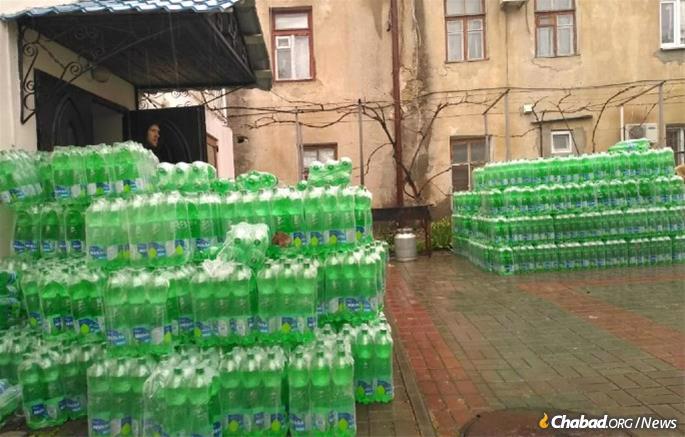
Yet, despite the challenges, Bessonova says her faith keeps her going. “Life is very difficult right now. When somebody asks me: How are you? I always answer, ‘Thanks G‑d, all my family members are alive and fine.’ What else do I need?!”
She says that her family’s survival is in part thanks to the “huge and invaluable” help she has received from the Gotliebs, their staff and the Jewish community—with the help of the Jewish Relief Network Ukraine (JRNU), Chabad’s unified effort for wartime humanitarian work in Ukraine. Chabad’s on-the-ground network is directed by Chabad-Lubavitch emissaries like the Gotliebs throughout Ukraine.
Once a month, Bessonova submits a request for the necessities she needs—food, medicine, etc.—and receives a specially made package, which keeps them going until the next month’s package arrives.
And before every Shabbat and Jewish holiday, there are special baskets, which give them everything they need to celebrate according to tradition. She says she especially appreciates the attention that is put into the details, making sure that the packages contain things people actually need will use.

There is also a program to help people cope emotionally. She says she took advantage of this program, sometimes calling in the middle of the night, when she needed help getting her son, who has PTSD from his war experiences and required rehabilitation.
“I am telling you all this and grateful tears are running down my cheeks,” she said in a phone interview. “I have deepest gratitude to all from a bottom of my mother’s heart!”
Helping families like Bessonova is his priority, says Gotlieb. “People need food, they need to warm, and they need clean water. And it’s up to us to literally save their lives.”
